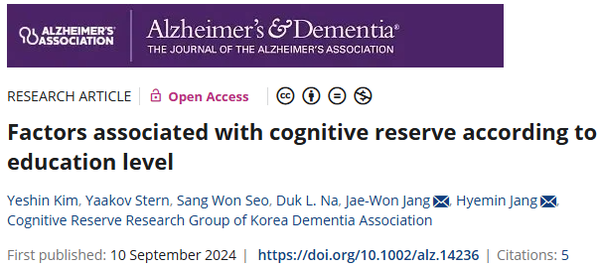
A research team led by Professors Kim Ye-shin and Jang Jae-won of the Department of Neurology at Kangwon National University Hospital has published a study showing that factors affecting cognitive reserve (CR) differ depending on education level.
The study is significant in that it provides a scientific basis for establishing prevention strategies for those at high risk of dementia in Korea. At a time when customized healthcare strategies are needed for the elderly with diverse socio-economic backgrounds, the findings are expected to be used as a practical basis for health policy formulation and community dementia prevention projects.
Cognitive reserve is a concept that explains why there are differences in the timing and rate of progression of dementia symptoms among individuals, even when brain damage has progressed beyond a certain level, and has recently gained attention as an essential research indicator in the development of dementia prevention and treatment strategies.
The researchers used data from 1,247 people enrolled in the Precision Medicine Dementia Cohort (PREMIER), which included 25 hospitals nationwide, to analyze further factors that affect cognitive reserve by education level.
The study is of academic significance because it included a group of older adults with low education, which is rare in Korean research.
According to the study, in the low-education group (elementary school graduation or lower), poor literacy, excessive sleep (long sleep), and diabetes were analyzed as the main factors that can reduce cognitive reserve.
In contrast, in the highly educated group (high school graduation or higher), in addition to low literacy and long sleep duration, depression was found to have a negative impact on cognitive reserve.
As for factors that improve cognitive reserve, “cognitive activities,” such as reading books, positively affected both groups.
However, daily physical activity, such as walking, also significantly improved cognitive reserve in the low-education group, suggesting that approaches to cognitive health should vary by education level.
“While dementia prevention strategies have been proposed primarily around cognitive activities, there have been limitations in applying them uniformly to the elderly population with different educational levels and daily environments,” Professor Kim said. “Tailored strategies that encourage regular physical activity and literacy programs may be more effective, especially for older adults with limited educational opportunities.”

The findings are published in the international journal Alzheimer's & Dementia.

